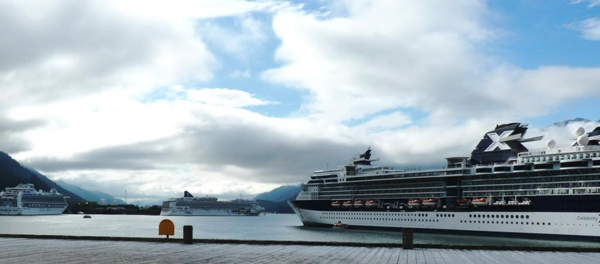
By 2015, every ship that operates on Alaska’s southern coast will be required to drastically cut their sulfur emissions. The State has been fighting that policy in court, and this week a federal judge threw out their case. APRN’s Alexandra Gutierrez reports.
For years, the international community has been trying to lower the amount of sulfur that ships put into the atmosphere. It’s nasty stuff that causes acid rain and damages human health.
“It causes all sorts of heart and lung diseases. It causes asthma,” said Sarah Burt, an attorney for Earthjustice who worked on the case. “It’s one of the most significant pollutants in poor air quality.”
Back in 2009, the 152 countries that are part of the MARPOL convention — short for “marine pollution” — agreed that Alaska’s coast should be part of a large ocean zone where emissions are tightly regulated. Ships would have to start using expensive low sulfur fuels, or they would have to invest in upgrading their exhaust systems.
That troubled the State of Alaska, which held that the regulations weren’t necessary because Alaska already has good air quality. The State, along with the Resource Development Council, sued the federal government on the grounds that treaty didn’t get proper approval from Congress or the review by the Environmental Protection Agency. They also argued that the new rules could hurt Alaska’s economy by lowering ship traffic and keeping cruises lines away.
The United States District Court didn’t buy it. On Tuesday, Judge Sharon Gleason dismissed the case for lack of jurisdiction. In her decision, she explained that executive decisions made by the Secretary of State are not up for judicial review.
Burt, who intervened in the case on the side of the federal government, said it’s a matter of protecting America’s international credibility.
“If a court then turned around and said, “Well, actually, no. For whatever reasons, we decide that we don’t want to actually implement the treaty that we have signed,’ it sends mixed messages to the international community and could potentially be very embarrassing for the United States.”
Department of Law attorneys were unavailable to speak to the case, but Gov. Sean Parnell’s office said in a statement they still believe Alaska was improperly included in the “emissions control area.” They may appeal the ruling to the Ninth Circuit Court.
In the meantime, the cruise industry is already preparing for the new standards. Earlier this month, Carnival Cruise Lines announced it plans to outfit 32 of their ships with new air-pollution “scrubbers” as a way of lowering their sulfur output.
agutierrez (at) alaskapublic (dot) org | 907.209.1799 | About Alexandra




